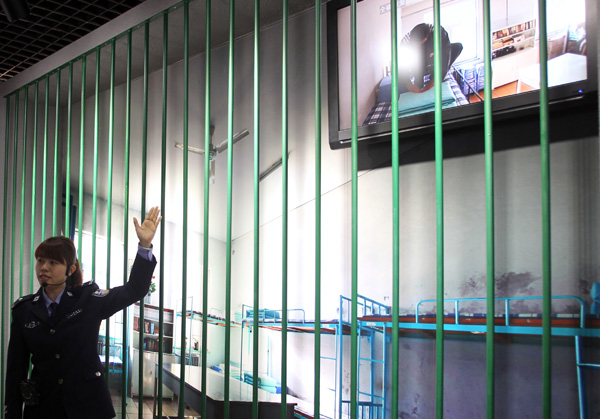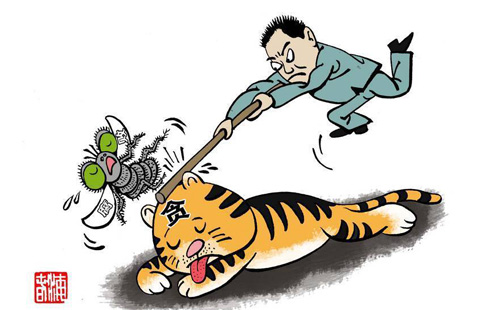Not schools for scoundrels
By Peng Yining (China Daily) Updated: 2014-12-18 08:12
 |
|
A member of staff at the Anti-Corruption Education Center in the Daxing district of Beijing shows visitors a picture of prison cell. Similar centers have been opened across the country. Zou Hong / China Daily |
As China's anti-graft campaign approaches its third year, behind-the-scenes efforts are being made to educate officials and dissuade them from accepting bribes or succumbing to other forms of graft, Peng Yining reports.
China Daily is publishing a series of reports focusing on efforts that help the country to move forward.
In the past two years China's crackdown on corruption has made headlines across the world as disgraced former officials have been hauled before the courts. So far, the campaign has netted more than 50 high-level officials, including Zhou Yongkang, a former member of the Standing Committee of the Political Bureau of the CPC Central Committee, and thousands of lower-level cadres.
But away from the glare of the media spotlight, strenuous efforts are being made to educate officials about the serious consequences of corrupt practices and prevent them from falling into the trap in the first place.
At the Guangdong Anti-Corruption Education Center in Guangzhou, the message is spelled out clear and simple. In the marble lobby a Communist Party flag, bearing a hammer and sickle and as big as half a badminton court, flies next to a crystal droplight that represents the Sword of Damocles, a symbol of the conflicting pressures facing those in positions of power.
The center's anti-graft exhibition features a reconstruction of a prison guardhouse: looking through the barred windows, one can see life-sized cardboard cutouts of three disgraced former officials standing dejectedly in a 2-square-meter cell, the walls behind them covered with scratched tally marks and pieces of doggerel. One message reads: "Painful days. Never come here."
The guardhouse, including the messages scratched on the walls, is an exact replica of a real building in Guangzhou, according to Xue Mei, the head of the center. "It's used to warn officials. To make them fully aware of the serious consequences they face if they do something they shouldn't."
The center has also reproduced a scene of a former city security bureau chief hiding his ill-gotten gains in a 1-meter-high safe box set inside a double wall in his parents' isolated farmhouse. Above the safe box, a large flatscreen television plays a looped video of the man, who was arrested in 2008 on charges of accepting bribes worth more than 18 million yuan ($3 million), crying and confessing his crimes.
"I am so full of remorse," the former official, wearing an orange prison uniform, said with a sob. "I have embarrassed my family and my ancestors."
Nationwide effort
Anti-graft, or clean government education bases have opened across the country, and are playing a major role in making officials think twice about graft.
Since it opened in April 2013, the Guangdong Anti-Corruption Education Center has received more than 100,000 visitors, including about 600 departmental-level officials. This year, the monthly visitor numbers have risen from 3,811 in March to 7,660 in April, and more than 10,000 in September.
There are more than 200 similar centers, of varying size and scale, throughout Guangdong province. Meanwhile, Xiamen, a coastal city in Fujian province with a population of 3.7 million, has 52. Hebei province has 28 provincial-level centers, and Hubei province opened its first village-level anti-graft education center last year.
Centers for training officials at city level and above are usually located near prisons that house corrupt officials. The juxtaposition is intended as a warning, of course, but also it's convenient for transporting convicted former officials to speak to cadres visiting the centers.
According to Xue, the Guangdong center has hosted more than 10 speakers, including a former mayor who was sentenced to 11 years for accepting bribes.
"The first thing she said was, 'I used to sit where you are sitting, listening to other people making speeches, but now I am on the stage'," Xue said. "She was in tears, and so were the audience, many of whom were her former colleagues. They recognized her, and waved when she walked into the room."
Xue said the prisoners only address officials in positions considered to be at high risk of corruption, but tours of the prisons where corrupt cadres are held are also a part of the program for higher-level officials.
Guo Jin, head of the Beijing anti-graft education center, said: "We frighten officials away from corruption by showing them the cost of accepting bribes."
Founded in 2006, the Beijing education center, one of China's first anti-graft centers, has received more than 320,000 visitors, according to Guo.
In a video shown to visitors before they enter the exhibition hall, a heavy steel door slams shut, its hinges squealing, and then prisoners are seen exercising in blue uniforms behind barbed wire as a harsh wind scatters fallen leaves.
"I put the video on a large screen and turn the volume up to maximum," Guo said. "The effect has to be striking to make the visitors realize that committing a crime brings serious consequences."
The exhibition compares the lives of dozens of corrupt officials, showing them before and after they were caught. In one photo, a former district head in Beijing, who took more than 16 million yuan in bribes, is shown drinking red wine at a luxury banquet, but in the next shot he's wearing a prison uniform and sitting on a stool eating steamed bread and vegetable soup with a wooden spoon.
Another exhibit shows contrasting photos of a former official addressing a meeting and assembling cardboard boxes in prison.
A large photo of prison cells is flanked by a TV that plays surveillance video of the prisoners' daily lives: performing menial tasks, such as folding the quilts on their bunk beds, and sweeping up.
- Beijing courting overseas tourists
- China pledges $3b investment fund for Central, East Europe
- China's 'saddest city' makes way for water diversion project
- Graft watchdog steps up SOE investigations
- Relocated parents face hard lessons
- China's Xi receives highest rating among world leaders
- Beijing wins central approval for new international airport
- Chinese New Year's Eve resumed as holiday
- China demotes 1,000 'naked' officials
- Family of wrongly killed man may get $193,860: media







